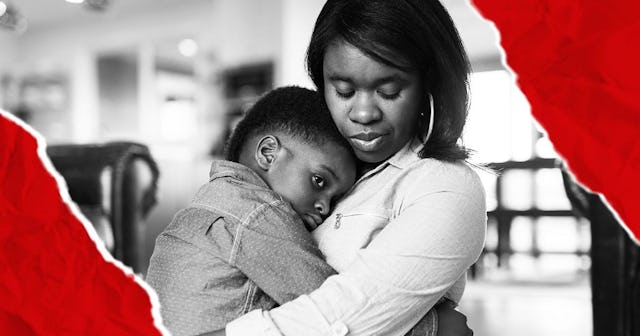Black Moms Are Parenting Through Two Public Health Crises Right Now

I’m outraged. I’m hurt. By my estimation, I have about 15 minutes to finish making dinner before one of my sons needs me to open, turn on, or answer something. But my head is full. The mental space I usually have available is occupied by the image of George Floyd twisting and turning to try to live while he was murdered by a knee on his neck. I remember to put the cheese on the broccoli — otherwise they’ll both just poke it and shove it around the plate.
Soon, it will be time for a movie — once a weekly tradition that’s now a nightly transition since the coronavirus pandemic changed how we operate. We don’t hit the arcade, the trampoline park, or even the playground anymore. There’s no school right now. Part of me feels an abundance of relief knowing my kids are home safe with me and not out in a world that often sees them as problems and nuisances at best, and suspects and target practice at worst. The other part of me, however, knows that Breonna Taylor probably felt safe in her own home, too, when she was fatally shot eight times when police officers entered her home.
It feels like it was just a week or so ago when the aspiring nurse and certified EMT’s life was taken, but it has been months. The tragedy happened within days of the World Health Organization declaring the coronavirus outbreak a pandemic. Racism has been an ongoing public health crisis. No national or global health organization will declare it as such, but its effects are evident. Anti-Black racism kills Black people and traumatizes Black neighborhoods. It causes illness, both physiological and mental.
gilaxia/Getty
The chronic stress of racism, now recognized by researchers, starts leaving its impact early. Black women are faced with a higher risk of dying during and after childbirth. Black babies are born fighting for their lives, as they are 50% more likely than white babies to be premature. Soon after, we send our Black children out into schools where white supremacy is embedded into classroom cultures and they are subject to implicit racial bias. We nurse wounds when our children have their first experience with being called the n-word or when they are punished harshly by teachers and school administrators in comparison to their non-Black peers. The individualized racist experiences and the institutional ones will never go away. There’s no end date. As the nation opens back up, I listen to other parents talk about the pressures and anxiety they are feeling sending their children back to school. Black mothers know this anxiety well.
After dinner, the kids are restless, so every night I focus my energy on making sure they are entertained and we are engaged as a family. The coronavirus pandemic was new territory for all of us. Racism, for Black parents, is not. It’s an ongoing public health crisis in the U.S. There’s no coordinated national response to mitigate the impacts of this country’s racist history. Little to nothing is done to reduce the excessive force and police militarization Black people are subjected to, so we’ll continue to exert our energy screaming that Black lives matter and doing the work to make it known. Black moms will continue to be the village — raising Black children to be both strong and nurtured, both aware of the functions of white supremacy and still free.
Parenting doesn’t stop because the world has shut down. In fact, mothers everywhere are more often than not carrying the burden of figuring out how to work while caring for their children. Racism and the harm it causes will never stop either. We are grieving and suffering collective trauma as we personally experience death and read about the people all around us dying from COVID-19, and with a disproportionately high rate of Black people dying from the virus at that. We are also grieving for George Floyd, Breonna Taylor, Ahmaud Arbery and the notion that Black people are still crying out to be seen as humans whose lives matter. These collective traumas are the response to two public health crises. Black moms are left to figure out how to parent through them both.
This article was originally published on